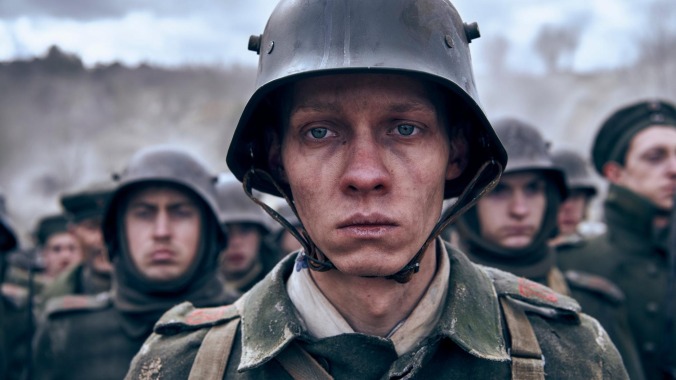All Quiet On The Western Front vividly and poignantly reminds moviegoers that World War I was hell
Director Edward Berger injects visceral intensity and visual poetry into his powerful adaptation of Erich Maria Remarque's 1929 novel

World War I ended a little more than a century ago at this point, and it’s never felt like more of a historical blank slate on which to project our fears, our hopes, and our own cultural darkness. World War II still stands as a righteous crusade against evil in the eyes of Western popular culture, but our connection to the original Great War is something much more tenuous, more open to interpretation, and perhaps even intimacy in its storytelling. Perhaps that’s why Sam Mendes’ sweeping epic 1917 and its story of survival against all odds caught on so well with audiences and awards organizations. It was easy to superimpose ourselves onto the battlefield in front of Mendes’ camera, and imagine our own daring rescue missions.
Edward Berger’s All Quiet On The Western Front, the third major cinematic adaptation of Erich Maria Remarque’s legendary novel, is playing with many of the same raw materials as Mendes’ more recent, Britain-focused hit. You’ll find more long takes of futile charges over trenches, more moments of quiet before the inevitable storm of war, and more young actors thrown into the crucible that makes boys into warriors. But in a world that has since been ravaged by a pandemic and a new European war, Berger’s film sidesteps the inevitable comparisons to Mendes (much less Lewis Milestone’s 1930 Best Picture winner) to instead give us something bleaker, more brutal, and perhaps more honest. This is a film about the boys who don’t come home, and its story proves both deeply affecting—and surprisingly timeless.
The fighting in Berger’s film, as in Remarque’s novel, centers on Paul (Felix Kammerer), a young German student who’s swept up in the nationalism of the war movement and enlists for a one-way ticket to the front lines in the fight against France. Paul begins the film bright-eyed, smiling, eager for the mantle of “veteran” and “hero” that will drape his shoulders when he finally comes home. What he doesn’t know is that his uniform was just recently stripped off a corpse and laundered for re-use, that his path to so-called glory lies through miles of mud, and that his band of idealistic friends will not be intact by the end of the war.
After capping off the film’s opening act with a terrifying depiction of Paul’s first brush with combat, Berger leaps forward to the fall of 1919, the final days of the war. Now a hardened soldier with the end of his time on the front in sight, Paul has settled into the mundane, bleary-eyed life of the Great War, while the real battle is fought elsewhere. As a German diplomat (Daniel Bruhl) races against time to forge an armistice, the country’s generals try to keep fighting, because it’s the only thing they know how to do.
 Keep scrolling for more great stories.
Keep scrolling for more great stories.
